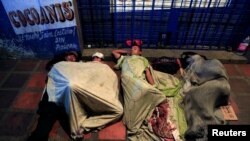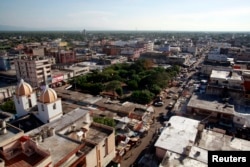The U.N. refugee agency and Colombian authorities are opening a reception center in the border city of Maicao, in the La Guajira region, to offer humanitarian assistance to vulnerable Venezuelans fleeing their country.
Every day an estimated 5,000 Venezuelans flee violence, persecution and socioeconomic distress in their country. Many have taken refuge in Colombia, which is hosting more than one million Venezuelan refugees and migrants.
There are no refugee camps in the country. Instead, those who arrive are hosted by local residents or live in makeshift shelters or on the street. The U.N. refugee agency says the new reception center, the first of its kind in Colombia, aims to provide the most vulnerable people with temporary shelter, food, water, basic medical care, and other services.
The UNHCR says the center initially will be able to assist 350 people, but has the capacity to expand in the future.
"Maicao is one of the cities in La Guajira with the highest concentration per capita of refugees and migrants from Venezuela," said UNHCR spokesman Andrej Mahecic. "Hundreds of people, including children, the elderly, persons with disabilities and critical medical conditions, are forced to live on the streets, due to a lack of alternative shelter options."
Venezuelans who have no documents are among the most vulnerable, Mahecic told VOA. He says refugees and migrants who cannot prove their identities have difficulty getting the aid they need, and they face many risks from unscrupulous people ready to take advantage of them.
"They may end up basically turning to the streets, to the coping mechanisms that may involve child labor or other forms, which are the negative coping mechanisms. And, certainly, that is the possible exploitation and abuse that we are looking at," Mahecic said.
More than 3.4 million Venezuelans are living abroad; most have left their country since 2015. The United Nations is appealing for $738 million to provide life-saving assistance to 2.2 million Venezuelans and one-half million host communities in 16 countries.





